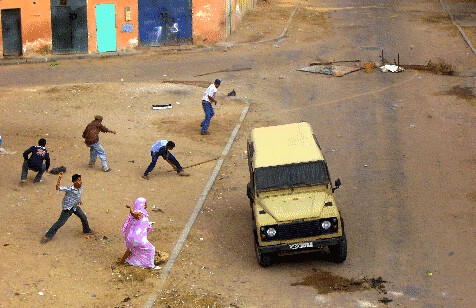
Intifada Sahara
Western Sahara is a territory in northwest Africa whose governance is still in dispute. The territory sits along the Atlantic coast, bordered by Morocco in the north, Algeria in the northeast, and Mauritania in the east and south.
Long ago, the Western Sahara was a Spanish overseas province. Spain abandoned it in 1976, and the territory was divided between Morocco and Mauritania; Morocco annexed the northern two-thirds of the Western Sahara while Mauritania annexed the southern portion. The rebel group known as the Polisario Front vigorously opposed the annexation and called for independence of the Western Sahara. They eventually pressured Mauritania to withdraw the southern portion in 1979, but Morocco merely assumed the southern portion abandoned by Mauritania.
From 1979 to 1991, guerrilla fighting between Morocco and the Polisario took place. A ceasefire agreement in 1991 called for a referendum among Western Sahara residents to decide between independence and affirming integration with Morocco. However, negotiations over how the referendum should be set up, who should vote, and consideration of process and procedure have resulted in delay such that even today a referendum has yet to be held. The sovereignty of the Western Sahara remains unresolved and Polisario has made threats in recent years to renew the fighting, claiming Morocco’s stalling tactics as a breach of the ceasefire agreement.
Attractions
The Western Sahara is almost entirely comprised of arid desert. In some areas, visitors should be careful as there are landmines set up by the Moroccan military. There is really nothing of interest in this territory. The coastal beaches are rather rocky and unfit for the type of beach and water sports activities enjoyed by tourists. There are also no wildlife or natural features in the Western Sahara other than dunes. The one draw in this territory is the rich fishing that is available at Ad Dakhla.
Climate
The climate in Western Sahara is hot and dry. Rainfall is rare, though you’ll encounter the odd flash flood. At night, the temperatures are really cold, which is typical of any desert.
People
Most of the people in the Western Sahara are Arab and Berber in ethnicity. They live as pastoral nomads, raising herds of cattle, sheep, goats, and camels. They work the phosphate mines or fish along the coast. Because there is virtually no rainfall, agricultural production is unsustainable.
History
The first Europeans to discover the Western Sahara were Portuguese explorers. In the late 19th century, Spain established a protectorate over the territory and it was made an overseas province in 1958. In 1976, Spain signed an agreement to transfer sovereignty to Morocco and Mauritania. The Polisario Front has continued to demand independence ever since. Mauritania agreed to renounce its claim in 1979, but Morocco has refused to give up the territory. Guerrilla fighting took place between the Polisario and Morocco from 1979 to 1991. A ceasefire agreement was signed in 1992 and a referendum on independence has been repeatedly postponed. The sovereignty of the Western Sahara remains unresolved to this day.


Comments